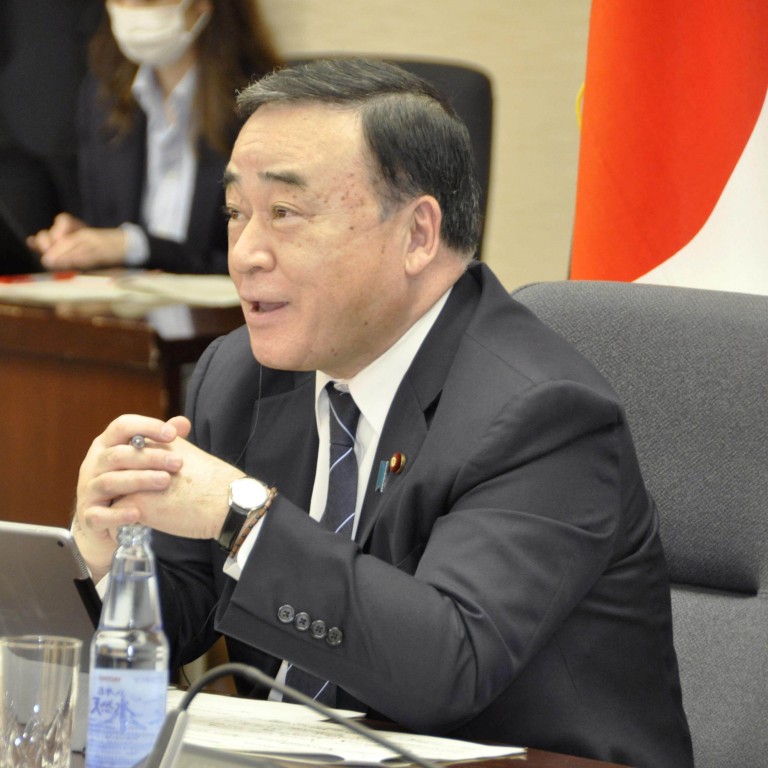
China labels India, Australia, Japan supply chain plan as ‘artificial’ and ‘unfavourable’ to global economy
- Australia, India and Japan formally launched the Supply Chain Resilience Initiative (SCRI) on Tuesday after the plan was first discussed informally in July at the height of the pandemic
- China was never officially mentioned, but the reliance on it as source of critical medical supplies and finished goods during the outbreak was clearly a key motivation for the initiative
A move by Australia, India and Japan to establish an initiative to “strengthen supply chain resilience” in the region that is viewed as an effort to lessen dependence on China has been criticised by Beijing as an “artificial” programme that could upset the global economy.
The Supply Chain Resilience Initiative (SCRI) was formally launched on Tuesday and will see new supply chains formed through joint business projects struck between the trio, who acknowledged “the [coronavirus] pandemic had revealed supply chain vulnerabilities globally and in the region”.
“The push to enact an artificial supply chain progamme will not be favourable to the stability of the global industrial supply chain, nor to the recovery of the global economy,” Chinese Ministry of Foreign Affairs spokesman Zhao Lijian said on Wednesday.
“We hope the countries involved will continue to be part of a free-market economy and honour trading rules, while carrying out activities that are beneficial to mutual trust in order to achieve a sustainable, balanced and inclusive global economy.”
Zhao also said that, broadly speaking, the creation of supply chains take time and that no country should expect to create mature supply chains overnight.
On Tuesday, Australia, India and Japan agreed to move ahead with the initiative following trade disruptions and shocks caused by the coronavirus pandemic.
The SCRI will see new supply chains formed through joint business projects struck between the trio, who acknowledged “the [coronavirus] pandemic had revealed supply chain vulnerabilities globally and in the region”.
China was never officially mentioned, but the reliance on it as source of critical medical supplies and finished goods during the outbreak was viewed as a key motivation for the initiative.
The SCRI aims to create a virtuous cycle of enhancing supply chain resilience with a view to eventually attaining strong, sustainable, balanced and inclusive growth in the region
“The SCRI aims to create a virtuous cycle of enhancing supply chain resilience with a view to eventually attaining strong, sustainable, balanced and inclusive growth in the region,” said a joint statement from Australia’s Minister for Trade, Tourism and Investment Dan Tehan, India’s Minister of Commerce and Industry Piyush Goyal and Japan’s Minister for Economy, Trade and Industry Hiroshi Kajiyama.
Initial steps following the launch of the initiative include the trio sharing best practices on supply chain resilience and holding investment promotions and buyer-seller matching events to assist traders with the diversification of their supply chains.
They also said they would support more use of digital technology between the three countries, while also leaving open the possibility of expanding membership.
“The Ministers consented that expansion of the SCRI [to other countries] may be considered based on consensus, if needed, in due course,” the statement added.
Japan and India are important partners for Australia. I look forward to working closely together to strengthen supply chain resilience in our region
The ministers agreed to meet at least once a year to review the initiative and explore new steps, while pointing out the importance of the roles that business and academia will play.
“Australia’s supply chains have generally proven resilient, but the pandemic has highlighted the need for greater international cooperation to strengthen supply chains,” Tehan said.
“Japan and India are important partners for Australia. I look forward to working closely together to strengthen supply chain resilience in our region.”
Series: one year of China-Australia trade tensions
Jagannath Panda, East Asia coordinator at the Manohar Parrikar Institute, said the SCRI deal would not contradict with other pacts, including Regional Comprehensive Economic Partnership (RCEP), as they both work to expand trade.


